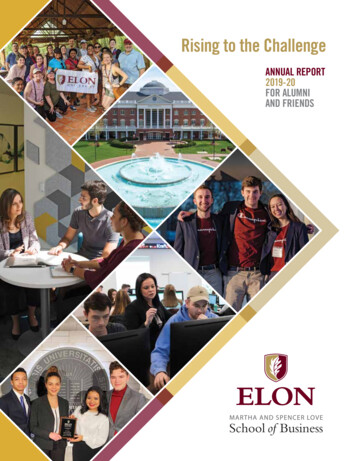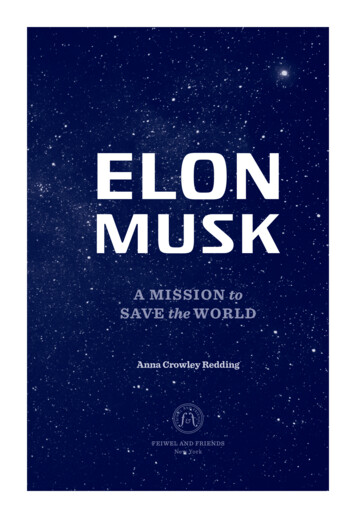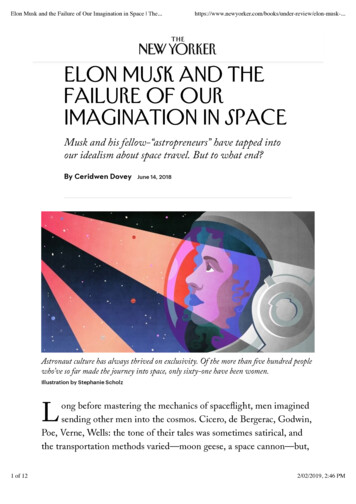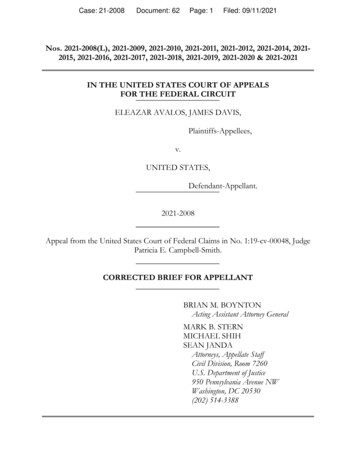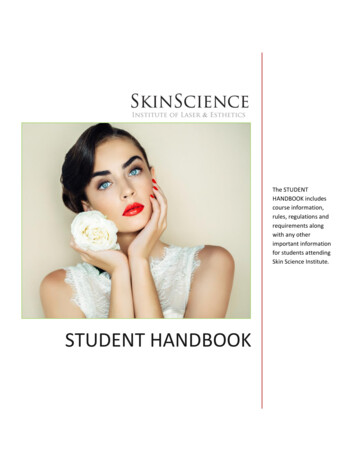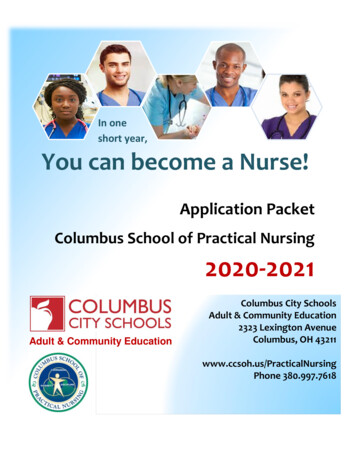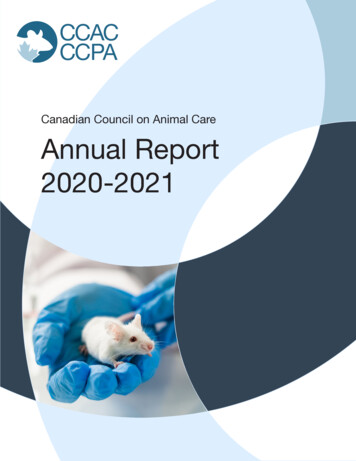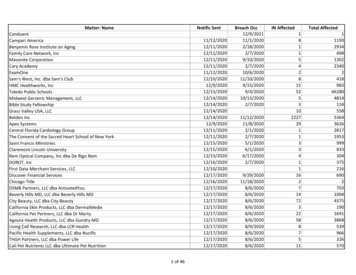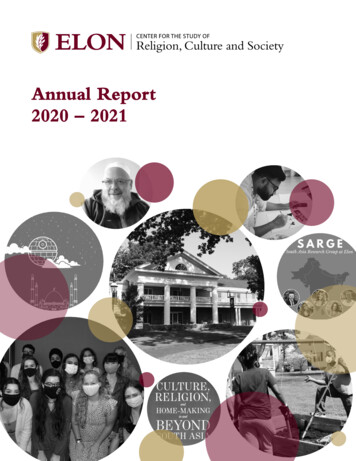
Transcription
Annual Report2020 – 2021
CONTENTSDirector’s LetterFrom the 2020-2022 CSRCS ScholarA Year of Programming InnovationCourse videosReligion TrendingDecentering Whiteness workshopsZoom lecturesResearch and ScholarshipOn the Edge Symposium: Religion at the BordersPublicationsLuce Collaborative on Public ScholarshipCommunity-based Participatory ResearchUndergraduate Research and the Undergraduate ExperienceMultifaith ScholarsUndergraduate Research grantsConference presentationsSURF DayCourse-embedded Undergraduate ResearchNewsTransitionsCSRCS Team
EMERGING STRONGERIt will be obvious to all readers that 2020–2021 posed serious challenges to thework of the Center for the Study of Religion, Culture, and Society. For theCSRCS team, the questions this historic year posed took shape around the searchfor new modes of engagement and emerging Elon commitments to addressingour collective sense of national and global emergency: How should a center soclosely identified with high-profile, in-person events adapt to pandemic lockdownand isolation? How does it respond when society is, at the same time, in crisisover the accumulated injustices of history? What is our role when its democraticinstitutions and norms face their gravest threats in over a century? How can wesupport instructors working to master entirely new modes of course delivery?In his reflections that follow, the CSRCS’s first faculty scholar, Sandy Marshall,eloquently addresses such questions. This report will give some indication of ourthought processes and decision-making during a year when higher educationin general and Elon in particular confronted circumstances that have imperiledinstitutions and programs across the country. I am confident the Center for theStudy of Religion, Culture, and Society is emerging stronger than ever and moresure of its mission as a result of grappling with the unprecedented. I am grateful toAmy Allocco, Multifaith Scholars Director, and CSRCS Scholar Marshall—theiringenuity and unflagging dedication to Elon faculty, staff, and students made asuccessful year possible.Brian K. PenningtonProfessor of Religious Studies &Director of the Elon Center for theStudy of Religion, Culture, and Society
CLOSING THE GAPTo say that the 2020-2021 academic year was challenging would be a colossal understatement. Elonstudents, faculty, and staff will long remember this year for the anxiety created by the Covid-19pandemic and the difficulties of social distancing. It was also a year of impassioned activism followingmonths of Black Lives Matter protests sparked by the murder of George Floyd in May 2020. The renewedracial justice movement prompted critical self-reflection, introspection, and difficult discussions on campus.Responses included increased awareness of and activism surrounding the Confederate monument atthe Alamance County Courthouse in Graham and calls to memorialize Wyatt Outlaw, the first AfricanAmerican Commissioner and Constable of Graham, who was lynched where that monument stands. Neoconfederate extremism confronted campus directly when a pro-Trump convoy careened through campusin September and drivers shouted racist and obscene remarks at students and faculty. Indeed, this academicyear will also be remembered for the contentious presidential election cycle, culminating in a right-winginsurrection at the Capitol on January 6th, aimed at disrupting the democratic transfer for power.The pandemic, protests, and insurrection exposed the inequalities and divisions that continue to confrontAmerican society. As we begin a hopeful transition to a post-pandemic world, many caution against arushed return to normal, given how unhealthy the status quo ante proved to be. As we reduce our physicaldistance from one another, can we maintain a commitment to also reducing social and cultural distancewhile closing racial, economic, and gender-based gaps in our society? As “we” come together again, weface questions about what, if anything, unites us. What values or vision for the future do we hold incommon? This is a question that confronts communities, campuses, and our country as a whole.
At a time when the weakening of traditional bonds of religious affiliation and national identity hasresulted in resurgent religious and nationalist extremism on one hand and unmoored social anomie on theother, public scholarship on these questions is vital. Public scholarship and community engagement is atthe heart of the CSRCS’s mission. For this reason, I am proud to have served as the first CSRCS Scholar,and proud to have dedicated energy toward broader public engagement this year.As this annual report demonstrates, the challenge of social distancing during the 2020-2021 academic yearimposed constraints but also opened possibilities for CSRCS programming. We converted our popularReligion Trending event series into a virtual format. The magic of Zoom allowed us to reach a broaderaudience and bring in outside speakers, while also archiving a recording of the conversation for futureclassroom use. Our successful speaker events and book discussion group took on new life. In my ownteaching, students used technology to overcome social distance in order to conduct oral history interviewsand co-create digital stories with community members, a capacity I plan to further develop in my role asCSRCS Scholar. Finally, after a great deal of uncertainty about the On the Edge symposium “Religion atthe Borders,” a combination of small virtual sessions, a large remote keynote address, and hybrid physical/digital photography and art exhibit, made for a memorable and meaningful experience for all involved.Though the creative adaptations we developed this year will no doubt continue to serve us in the future,we look forward to reduced restrictions on in-person gatherings and travel, allowing us to once againdirectly connect with communities far and near in our teaching, research, and engagement.Sandy MarshallAssistant Professor of Geography& CSRCS Scholar 2020–2022
A YEAR OF PROGRAMMINGINNOVATIONCOURSE VIDEOS FOR PANDEMIC TEACHINGIn the summer of 2020, as the entire campus—from Physical Plant to Media Services—gave itself over toplanning and preparing for pandemic instruction, the CSRCS began to commission video lectures foruse in an environment that would rely much more on digital content. Scholars and experts from aroundthe country recorded lectures with slide banks and other content for the use of instructors in online andhybrid courses, including 110. The CSRCS website will now maintain a library of these course videosas well as content from other events this year for use in future years—just one of the ways that Covidinnovation and discovery will continue to pay dividends. A current list of course video lectures includes:
Keeping it Reel: Muslims Changing Imagesof Muslims in Film and TelevisionAmir Hussain (Loyola Marymount University)This lecture examines how Muslims working in the filmand television industry today have helped to change thestereotyped images that cartoons, professional wrestling,and action movies once perpetrated.Black DharmaKrishni Metivier (Duke University)This lecture forges new pathways into the study of “Dharma Traditions” to open students’ eyes to rich andlittle-known spiritual intersections in the United States.The African Roots of Islam in AmericaUstadh Ubaydullah Evans (Scholar-in-Residence, American Learning Institute for Muslims)This discussion centers the Muslim influences brought to the Americas by enslaved African peoples. Withthanks to Elon’s Imam Shane Atkinson for organizing the talk.Defend the Sacred: Native American Religious Freedom beyond the First AmendmentMichael McNally (Carleton College)Legal historian McNally discusses how Native peoples, from North Dakota’s Standing Rock encampmentsto Arizona’s San Francisco Peaks, have repeatedly asserted legal rights to religious freedom to protect theirsacred places and practices. Cosponsored with the Joy Phillips Center for Interreligious Studies at theUniversity of St. Thomas.Religion, Spirituality, and HIVMagdalena Szaflarski (University of Alabama, Birmingham)Dr. Szaflarski reviews the scientific evidence for the role of religion and spirituality in the lives andtreatment of persons living with HIV.White Too Long: Reckoning with the Legacy ofWhite Supremacy in American ChristianityRobert P. Jones (Public Religion Research Institute)Providing both a history of racism in US denominationsand contemporary polling data, White Too Long deliversa provocative examination of race and American Christianity.The Metaphysics of Racism in IslamBilal Ware (University of California, Berkeley)Dr. Ware draws from the Qur’anic text and his field research in West Africa to closely examine racism.With thanks to the Elon Muslim Society for organizing the talk.Confederate Monuments as Sacred ObjectsRyan Newson (Campbell University, Elon Class of 2007)Why do Confederate memorials spark such fervent devotion, especially among white southerners?Pandemic Religion: How Plagues Shaped Christianity from the Past to the PresentJohn Penniman (Bucknell University, Elon Class of 2005)This lecture explores the consequences of epidemics on religious communities from antiquity to today.
Elon 2021 Baccalaureate AddressValarie Kaur (Revolutionary Love Project)Interfaith Activist and documentary filmmaker ValarieKaur was in college when she started her quest toinvestigate hate violence against Sikhs, Muslims andArabs. Fueled by the grief she felt in the aftermath ofher uncle’s death—a fellow Sikh and victim of a hatecrime following 9/11—she searched for answers thattook her years to understand.Valarie gave an insightfuladdress to students and faculty, drawing from herrecently published book, See No Stranger.“If you choose to seeno stranger throughoutyour life, it will give youthe wisdom to show upwith courage to remakethis world, to reorderthis world in such away that leaves no onebehind.”– Valarie KaurBlack Foodways and Liberation: The Center co-sponsoredthe 2020-2021 Annual Geography Lecture given on March26th by Priscilla McCutcheon, Assistant Professor ofGeography at the University of Kentucky. The talk, “BlackLiberation: Revolution and Reconciliation in our Food System,”examined the use of Black liberation theology as a frameworkfor understanding the pursuit of freedom through food andagriculture. In this lecture, Dr. McCutcheon discussed keyconnections between Black liberation, food, and agriculture,paying specific attention to the importance of “revolution” and“reconciliation,” including why attention to Black liberationtheology is called for in our present moment. The GeographyLecture was co-sponsored by the CREDE and African andAfrican American Studies at Elon.
RELIGION TRENDINGReligion Trending is an informal gathering of faculty and staff to discuss religion-related topics that aretrending in the news. Organized in an ad hoc manner in response to pressing issues of import, these eventsdraw on-campus expertise to help faculty and staff unpack topics that may be the subject of discussionin our classrooms, residence halls, and offices. In previous years these gatherings have taken place at OakHouse. Due to Covid-19, the CSRCS unveiled “Religion Trending:Virtual Edition” using Zoom. Theonline format allowed for a larger audience, facilitated recording and archiving for future use, and enabledoutside guest speakers to more easily contribute to the conversation. Religion Trending:Virtual Editiondiscussions on the following topics were held in the Fall semester, January Term, and Spring semester; allare available on the CSRCS Kaltura channel.Hagia Sophia: In August, Evan Gatti (Art History),Baris Kesgin (Political Science) and SumeyyePakdil (Religious Studies) joined in for a discussionof the controversial conversion of Hagia Sophia inIstanbul from a museum into an active Islamic prayerspace in 2020. Built as a Byzantine Cathedral andlater converted into a mosque during the Ottomanera, the space became a secular museum underAtaturk, founder of the Turkish Republic.Religion and the Capitol Insurrection: Following the Capitol Insurrection on January 6th, ReligiousStudies faculty Lynn Huber and Andrew Monteith led a discussion on religious ideologies, identities,and iconography on display during the attack. The discussion explored the intersections of whitesupremacy, charismatic Christianity, and neo-pagan identitarianism.White Supremacy and Christian Identity: Seeking to further deepen the discussion on religion andright-wing extremism, Megan Squire (Computer Science) and guest speaker Joan Braune (Philosophy,Gonzaga University) gave a talk examining the religious (and anti-religious) views of far right extremistgroups, ranging from the Christian Identity movement to millenarian accelerationists.May the Fourth Be With You—Star Wars and Islam:Ending the intense academic year on a lighter note, the Centerhosted a special Star Wars Day/Ramadan edition of ReligionTrending on May the 4th examining the religious themes in StarWars, including the elements of Islamic spirituality and aestheticsfound in the franchise. Elon’s Imam Shane Atkinson andZaytuna College graduate Aasiya Sellars led the nerdfest.Popular, it was.
DECENTERING WHITENESS WORKSHOPSDecentering Whiteness in Biblical Studies Classes: The CSRCSco-sponsored a set of Summer 2021 workshops on anti-racist pedagogiesin the teaching of biblical literature and history developed by Dr. LynnHuber, Director of Honors at Elon and Professor of Religious Studies.Conducted by leading scholars of religion, race, and the bible, the seriesof six, stand-alone workshops addressed the “lack of pedagogical anddisciplinary training among biblical scholars for anti-racist teaching onthe Bible.” Recognizing that students as well as professors often do notsee or acknowledge white supremacy in Western traditions and thatmany are raised in racially segregated religious traditions,the series offered anti-racist pedagogy training for professorsof biblical studies often not available to them in graduateschool or through professional development programs. Moreinformation about the workshops is available athttps://decenteringwhiteness.blog/.White Supremacy and US Christianity: Robert P. Jones, CEO of Public Religion ResearchInstitute (PRRI) and one of the country's leading pollsters, spoke via Zoom on Oct. 27 about his mostrecent book, White Too Long: The Legacy of White Supremacy in American Christianity. Part memoirof his Southern Baptist youth, part analysis of more than a decade of polling data, the book examines therole of Christianity in sustaining white supremacy in US history. In his talk, Jones emphasized how “aclose read of history reveals that we white Christians.haven't been just complacent or complicit .buthave been responsible for perpetuating a project of white supremacy that has framed the entire Americanstory.” A lively discussion with Elon professors Damion Blake, Buffie Longmire-Avital, and ToddiePeters followed. Jones has now spoken at Elon in each of the previous three national election cyclesand was one of the first speakers invited to campus by the CSRCS—we are delighted that our longrelationship with PRRI continues.
COURSE GUEST LECTURESThe pandemic provided an unanticipated opportunities for scholars and their audiences across thecountry to engage with one another via their laptops. In addition to the many virtual lectures notedelsewhere in this report, the CSRCS supported classroom visits by a variety of other Zoom talks byscholars from around the world. A few of those included:Jack Jenkins, reporter and analyst for ReligionNews Service, visited Anthony Hatcher’s Religionand Media course to talk about his own journeyinto religion reporting and his ongoing work onthe religious left in the US. He recently publishedhis book, American Prophets, discussing theintersection of religion and progressive politics.Amanda Lucia, scholar of global Hinduism spoke to multiple studentaudiences about her new book on transformational festival culture in the US,White Utopias: The Religious Exoticism of Transformational.Sankha Banerjee, Kolkata artist and graphic novelist, spoke toREL 172: Epic Tales from India about his work on a series ofbooks based on the Mahabharata.
RESEARCH ANDSCHOLARSHIP2021 SYMPOSIUM: RELIGIONAT THE BORDERSOn the Edge Symposium: “On the Edge” is a bi-annual symposium at Elon University that bringstogether scholars working at the theoretical and methodological boundaries of those fields that have astake in the critical analysis of religion—law, history, psychology, anthropology, literature/textual studies,philosophy, art history, political science, classics, sociology, geology, folklore, and gender studies, to namea few. “On the Edge” aims to exercise a self-conscious attention to methodological advances that can bemade through interdisciplinarity. Its proceedings contribute to a richly contextualized and multi-layeredunderstanding of the role of religion in societies past, present, and future.Pictured: Elon faculty and speakers gather virtually for the 2021 On the Edge Symposium.
The CSRCS hosted its regular interdisciplinary symposiumvirtually on February 11-13, 2021. Faculty convenershelping to organize the symposium were Evan Gatti (ArtHistory), Shayna Mehas (History), Sandy Marshall(Geography), and Amy Allocco (Religious Studies). Thisyear's theme, “Religion at the Borders,” focused onthe ways that cultural practice takes shape in the contextof borders, whether they were conceived as internationaldemarcations or cultural boundaries. Many papers concernedgeographical borders that delineate religious identities; othersconsidered how recitations, practices, and rituals may alsodefine the boundaries of belonging within and for religiouscommunities. Hybridities in borderlands were a majortopic of deliberation: borders separate, but they can alsobe bridges—areas where people, cultures, genders, families,economies, and religious traditions meet and meld. Overthe three days of the symposium, twelve scholars from threecountries held discussions of their ongoing research intoborder issues on Zoom. Marshall and Mehas are currentlydeveloping a collection of essays from the symposium forpublication. Individual presentations included the following:Opening Keynote: Leah Sarat (Arizona StateUniversity), “The Terror of ‘Safety:’ Christianity,Immigrant Policing, and Detention at theNation’s Edge”Brooke Brassard (McMaster University), “On theBorder of Monogamy: Suppressing and RewardingNon-Monogamy Among the Latter-day Saints andKainai Nation in Alberta, 1887-1905”Aniket De (Harvard University), “Divided States,Shared Songs: Gambhira Performances across theIndia-Bangladesh Border”Thomas A. E. Greene (University of NorthGeorgia) and Evan Gatti (Elon University),“Borders before the Nation-State”Justine Howe (Case Western Reserve University),“Affective Economies and the TransnationalRevivalism of Maryam Jameelah”Pictured: Key Note Speaker, Leah SaratHarini Kumar (University of Chicago), “At theBorder of the Sacred: Muslim Shrines as Spacesof Care in Coastal South India”Aarti Patel (Syracuse University), “Boundariesand Thresholds”Alexander Rocklin (Otterbein University),“Becoming Hindu in Panama: Contesting Raceand Religion across Borders”Ehsan Sheikholharam (University of NorthCarolina, Chapel Hill), “Borders within Borders:Superkilen as the Site of Assimilation”Barbara Sostaita (University of North Carolina,Chapel Hill), “Weaving the Wall: Care and theDevotional Femme in the Militarized Desert”Concluding Response: Banu Gokariksel(University of North Carolina, Chapel Hill)
Lens on the Border: Seeking to deepen the impact of its symposium and seed conversations oncampus about the situation at the US/Mexico border, the CSRCS mounted a multi-sited photographyexhibit entitled “Lens on the Border.” Curated by the Borderlands chapter of the Sierra Club, the exhibitfeatures the work of photographers and artists from the United States and Mexico, including indigenousartists. Rich in religious motifs, the artistic and photographic representations of human and non-humanlife in the borderlands. Previously exhibited in cities from Minneapolis to Mexico City, the exhibitfound a home at Elon University in buildings located around the Lambert Academic Village. Includingthe atmosphere of Numen Lumen Pavilion’s Sacred Space, where photos taken by Elon students whoparticipated in the US/Mexico Borderlands course in January 2019 were displayed. The exhibit’splacement symbolized the importance of bringing multidisciplinary perspectives to bear on the border.The strategic placement of the exhibit in high traffic corridors enabled students, staff, and faculty to takein bits and pieces of the exhibit on their way to class.Pictured:The Virgin ofGuadalupewatchesover waterjugs left formigrants inthe SonoranDesert. Photoby AlejandraPlatt-Torres.Keynote Address Highlights Conflicting Christian Commitments at the US Mexico Border:Leah Sarat of Arizona State University delivered 2021 the On The Edge symposium keynote address,“The Terror of ‘Safety:’ Christianity, Immigrant Policing, and Detention at the Nation’s Edge.” In herlecture Sarat highlighted the stories of two Christian leaders whose lives were closely impacted by theprivate, for-profit immigrant detention industry: an asylum-seeker from El Salvador who emerged as apeer faith healer during four years at Arizona’s Eloy Detention Center, and the former national Directorof Chaplaincy for CoreCivic, the company that profited from her time behind bars. These stories providedinsight into the commodification of human beings and immigrant policing in borderlands and offered awindow onto the intersection of Christianity with broader debates about safety, fear, liberation, healing,and personhood within the U.S. carceral landscape.
PUBLICATIONSTwo new major publications supported by the CSRCS appeared in 2021. Center faculty also publishedseveral articles and chapters this year.Culture, Religion and Homemaking in and Beyond South AsiaEdited by James Ponniah (Fortress Press, 2020)Culture, Religion, and Homemaking in and Beyond South Asia grows outof a 2016 conference co-sponsored by the CSRCS with its internationalpartner and conference host, the University of Madras, in Chennai, India. Itexplores how rituals, beliefs and social practices repurpose or re-envisionhome in relation to experiences of modernity, urbanization, conflict,migration and displacement. Authors examine spaces of contestation overthe categories of “home” and “religion,” including interfaith families, cities,and sacred places. The book’s forward was written by Amy Allocco andBrian Pennington. For more information, see here.Body and Religion 4/1/2020Special Issue: The Religious Body ImaginedEdited by Pamela D. WinfieldThis special issue (here) includes articles and papers from the2019 On the Edge Symposium hosted by the CSRCS. The twoElon faculty conveners for that symposium, Prof. of ReligiousStudies Pamela Winfield and Assoc. Prof. of Spanish MinaGarcia-Soormally, are featured alongside four other authorsin the issue guest-edited by Winfield. A book based on the 2019symposium is also forthcoming from Equinox.CSRCS Scholar Sandy Marshall published the article,“Intergenerational Place-based digital storytelling” withco-authors D. Smaira, and L. Staeheli in the journal,Children’s Geographies. Marshall was also awardeda Palestinian American Research Center ResearchFellowship for the project, “Sacred Space/ContestedPlace: Intergenerational Memory and The ShiftingMeanings of Joseph’s Tomb.” The fellowship is fundedby the U.S. State Department's Bureau of Educationaland Cultural Affairs through an agreement with theCouncil of American Overseas Research Centers.
MFS Director Amy Allocco had several publications appear this year.She was the guest editor with Jennifer D. Ortegren of MiddleburyCollege for a special double issue of Fieldwork in Religion titled “ShiftingSites, Shifting Selves: The Intersections of Home and the Field in theEthnography of India.” In the issue she also authored “ContextualizingHomes and Fields in the Ethnography of India” (with Ortegren) and“Shifting Technologies of Reflection: Intergenerational Relationships andthe Entanglements of Field and Home.” Allocco also published two majorresearch articles based on her Domesticating the Dead project:“Vernacular Practice, Gendered Tensions, and Interpretive Ambivalence inHindu Death, Deification, and Domestication Narratives.” The Journal ofHindu Studies 13 (2): 144-71.“Bringing the Dead Home: Hindu Invitation Rituals in Tamil South India.”Journal of the American Academy of Religion 89 (1): 103-42.CSRCS Director Brian Pennington wrote the chapter, “(Neo)-liberal Challenges” for the newvolume. Interreligious Studies: Dispatches from an Emerging Field, edited by Hans Gustafson (BeaconPress 2020), the most recent contribution of CSRCS faculty to the development of the emerging fieldof interreligious studies. The book brings together thirty-six scholars from four continents who offer“dispatches” on the current state of this burgeoning field. Pennington also served as guest editor of aspecial roundtable for Modern Asian Studies and authored “The Haunt of Authenticity:Viswanath, thePariah Problem, and the Production of Modern Hinduism” for the issue.LUCE COLLABORATIVE ONPUBLIC SCHOLARSHIPThree Elon faculty members were members of a research team funded by theHenry Luce Foundation to envision a publicly-directed future for teaching andscholarship at non-sectarian religious studies programs. Andrew Monteith,Pamela Winfield, and Brian Pennington worked on the project overseen bySandie Gravett of Appalachian State University to understand the relationshipof religious studies to issues of public concern and to formulate strategies fororienting research and teaching toward more public audiences. These Elon facultymembers along with Anandi Silva-Knuppel of Lawrence University mapped thecurrent landscape of public religion scholarship, documenting the character of34 publishing outlets including websites, podcasts, and video channels. The fullten-member team reported preliminary results of their work at two sessions atthe November 2020 AAR/SBL meeting and are now developing publicationsto report their findings and extend the conversation about the need for nontheologically driven, publicly focused work by scholars in religious studies.
COMMUNITY-BASEDPARTICIPATORY RESEARCHCommunity-based Participatory Research (CBPR, for short) is a mode of inquiry into social problemsand issues that embraces ethical principles for ensuring that the interests and well-being of communitiesremain central to research that involves them. CBPR approaches encourage scholars to work alongsidecommunity partners as full participants in the research process, from the generation of research questionsto the collection of data and the dissemination of findings. Students and faculty doing research supportedby the Center for the Study of Religion, Culture, and Society have increasingly adopted CBPRapproaches. The work that CSRCS Scholar Sandy Marshall has done in collaboration as part of thePower and Place Collective’s efforts to collect oral histories of Alamance County is one example. ManyMultifaith Scholars are also adopting CBPR-inspired methods as they develop their undergraduateresearch projects. In 2020-2021, CSRCS Director Brian Pennington was able to participate in trainingoffered by Public Health Studies Associate Professor Stephanie Baker and Anne Meletzke, Director ofHealthy Alamance, a local non-profit, in CBPR principles. We are grateful to Drs. Baker and Meletzke forproviding this opportunity for training in CBPR as it assumes greater importance in the center.Pictured: Stephanie Baker, Public Health Studies Associate Professor.
UNDERGRADUATE RESEARCHAND THE UNDERGRADUATEEXPERIENCEMULTIFAITH SCHOLARSThe demands for social distance and curtailed movement did not dampenthe spirit of the Multifaith Scholars this year, as they remained as active asever. Scholars’ research naturally took new directions, as many opted forvirtual interviews or survey research, but the spring saw the seniors deliveringacademic presentations at multiple conferences and many of them developingmanuscripts for publication. Program director Amy Allocco continued towork with each scholar individually to strategize about pandemic protocolsand ensure each scholar had the support and resources they needed. Studentscontinued their work with the youth of the Burlington Masjid through onlineGame Nights, and all of MFS helped to rehab and plant the community gardenat the mosque. We are very grateful for the campus leadership shown by thegraduating seniors Sirja Dutta, Madison Gray, Sarah Jane McDonald, and KyleeSmith, who now go on to graduate programs and exciting careers ahead.Meet the New Class of Multifaith Scholars: In March, five members of the Class of 2023 werenamed members of the fifth cohort of Multifaith Scholars. Directed by Amy Allocco, this two-yearfellows program selects students to participate in specialized coursework, faculty-mentored undergraduateresearch, campus leadership, and community engagement in multifaith contexts. Students in theprogram are awarded 5,000 annually to support research and study in global contexts connected withreligious diversity, pluralism, and conflict. The newest members were selected based on their potential asacademically curious and socially engaged multifaith leaders committed to their development and theenhancement of their local and global communities. The2023 cohort brings new faculty mentors and new disciplinesinto the program. Students in this class are majoring inCreative Writing, Literature, International and GlobalStudies, Environmental and Ecological Studies, andReligious Studies. Eve
other, public scholarship on these questions is vital. Public scholarship and community engagement is at the heart of the CSRCS's mission. For this reason, I am proud to have served as the first CSRCS Scholar, and proud to have dedicated energy toward broader public engagement this year.
